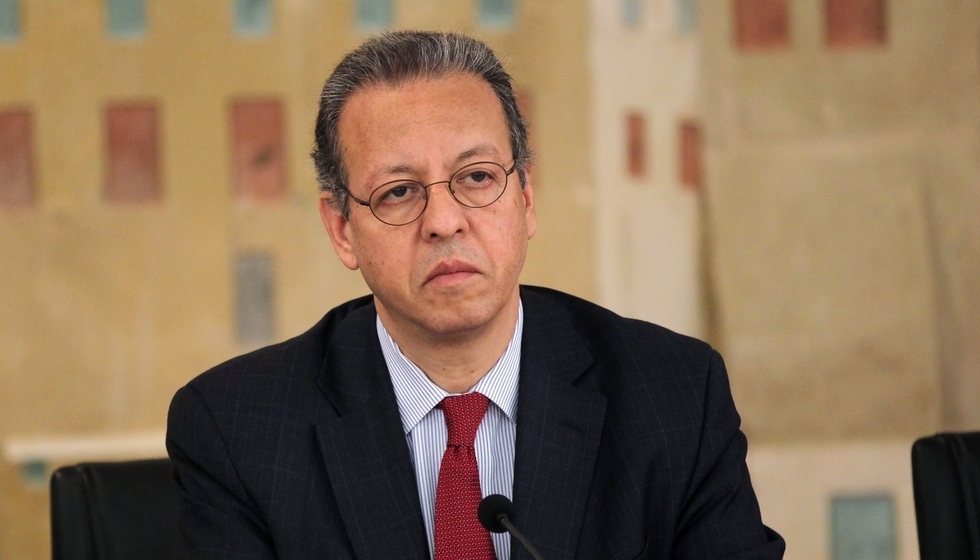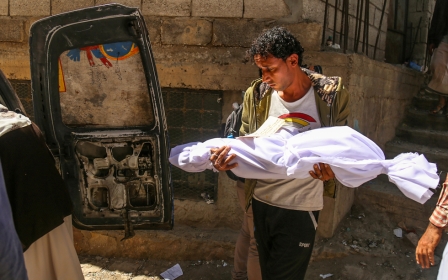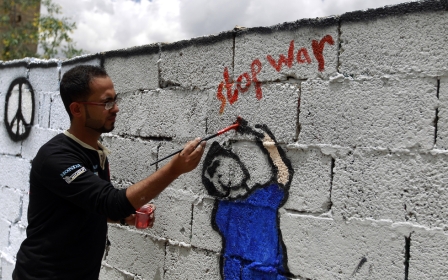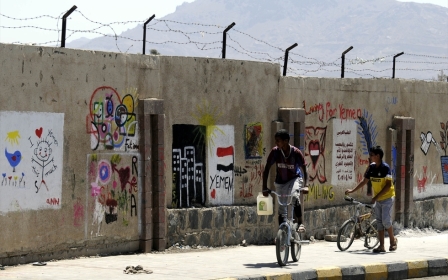
Did the former UN special envoy to Yemen legitimise the coup?
One mechanism for the United Nations to help parts of the world in crisis is to send a special envoy to a region to deal with its challenges. Jamal Benomar, a veteran Moroccan diplomat who worked with former US president Jimmy Carter on human rights issues, was chosen in 2011 to help to promote a democratic transition in Yemen after the Arab Spring.
As the special envoy for the United Nations secretary-general to Yemen, Benomar helped the parties of the National Dialogue Conference reach an agreement in Yemen to federalise the country. But when he stepped down late in 2015, it was amid a host of questions about his loyalty to the United Nations, his independence and his self-promotion into a lucrative job at the United Nations.
The media in the Gulf region criticised Benomar after he left his position. Many articles questioned his faithfulness and sometimes accused him of being biased towards the Houthi rebels from Saada in the north of the country.
Houthis are a Zaidi-Shia group, which is a school of thought within Shia Islam. It was named after Imam Zaid Bin Ali. Although Yemen is not a part of the Gulf Cooperation Council, the Gulf countries, especially Saudi Arabia, care deeply about the situation in its neighbouring country, Yemen, with which it shares an 1,800-kilometer border.
The Alriyadh newspaper, a Saudi pro-government daily, published a long profile about Benomar in April of 2015 titled “Jamal Benomar Falsifies The Face Of The Tragedy.” The story that appeared with the byline “Special,” heavily criticised Benomar’s role in Yemen. “Yemenis created #Benomar_lying hash tag in Twitter to discredit his statement, the hashtag tweets reached tens of thousands,” an anonymous editor wrote in the Al Riyadh daily.
Tawakkol Kerman, a Yemeni activist who was awarded the Nobel Peace Prize in 2011, also accused Benomar of leaning towards the rebels during an agreement he negotiated.
“It looks like the new agreement will lead to the disarming of the government army and will empower the militias, it’s with your blessings Mr Benomar,” Kerman said on her Facebook page.
The case of Benomar sheds light on the challenges the United Nations faces in bringing peace to conflict zones, and the difficulties diplomats face in remaining neutral in these conflicts. It also draws attention to the Saudi-Iranian divide and the revolving door between government and diplomacy. In addition, his tenure as special envoy sheds light on the Russian-Iranian partnership in the region.
Russia and Iran do not want the United States to be in control of the Middle East, and this is why they both are helping Syrian President Bashar al-Assad, whose father was an ally of the Soviet Union and worked against Western influence in the region. Assad’s family is Alawi, a Shia sect, and this is another reason why Iran, which is largely Shia, is supporting him. Iran is supporting Houthis in Yemen for the same sectarian reason. On the other hand, Saudi Arabia, which is dominated by Sunnis, is trying to stop the Iranian influence in the region.
Benomar's challenge in Yemen
The importance of the job of the special envoy of the secretary general dramatically increased after the 2011 Arab Spring. Special envoys are still trying to restore security and stability in Syria, Libya and Yemen.
Former UN Secretary General Kofi Annan served as a special envoy to Syria in 2012. The former US president, Bill Clinton, was the UN special envoy to Haiti in 2009. The job requires an in-depth understanding of complex and dangerous situations in conflict zones. Hence, most who take this job have comprehensive and well-established political experience.
Benomar’s extensive background in geopolitics gave him the upper-hand in this difficult job. The 59-year-old was born in Morocco in 1957. As a high school student, he was a political prisoner between 1976 and 1983 because of his sympathy with the left wing in the country. After his release, he worked with Amnesty International in London as a specialist on Africa, and after that he moved to Geneva where he joined the Human Rights Council of the United Nations. Benomar also served as a director to the Carter Center of Emory University where he worked with the former US president Jimmy Carter on human rights issues.
The Moroccan diplomat was chosen for the international mission in Yemen because of his extensive UN experience dealing with conflicts in many countries, including Kosovo, Bosnia, South Africa and Iraq. He worked with a staff of 75 between Sanaa, the capital of Yemen, and the UN headquarters in New York, where he briefed the Security Council about the latest updates in Yemen. His team consisted of 35 political workers, 25 administrative staff, based in Yemen and a 15-member security team, tasked with protecting the special envoy during travels inside the country.
Although weapons are accessible in Yemen, Yemenis succeeded in carrying out a peaceful revolution in 2011. After the Tunisian and Egyptian revolutions, thousands of Yemenis gathered in Sanaa, protesting against corruption and demanding the resignation of the Yemeni president Ali Abdullah Saleh. These demonstrations in Yemen were a major part of the Arab uprisings of 2011.
Different from Egypt, Libya and Syria, a political solution followed the Yemeni revolution and led to agreements between the conflict parties. The diplomatic effort made some successes under the auspices of the UN. However, the situation later deteriorated.
The Gulf initiative to solve the conflict in Yemen
After months of protests, Yemen’s neighbouring countries proposed the “Gulf Initiative,” which stated that Yemeni President Saleh’s power would transfer to his vice president, Abdu Rabbu Mansour Hadi, 70, a Sunni from Abyan, a city in the south of Yemen. He was a consensus candidate of the Yemeni political parties, agreed on to replace Saleh, 73, who is a Zaidi Shia, from the northern region of the country.
By 23 November 2011, Saleh signed the initiative in Riyadh and the political transition process was announced. The Gulf Initiative was internationally accepted and sponsored by Benomar, who was at the beginning of his tour in Yemen. “This is a historic day. It is time to work for the country reconstruction and national reconciliation and to achieve security and stability,” Benomar said after the signing ceremony in Riyadh.
On 21 February 2012, Hadi was the only candidate of the presidential election that was held as an outcome of the Gulf Initiative. He won with 99 percent of the votes and was declared on 27 February as the president of Yemen who will lead the transitional period.
It was a promising start, but it did not lead to security or stability as the Yemenis had hoped. Saleh decided to take revenge on those who took him off the throne. He formed a new alliance with the Houthis who had been his adversaries when he was in power.
The National Dialogue
Based on the Gulf initiative, all Yemeni parties agreed upon a national dialogue to draft a new constitution. On 13 March, 2013 Benomar succeeded in gathering the parties around the dialogue table chaired by Interim President Hadi. There were some difficulties in agreeing on the implementation of the Gulf Initiative. Benomar had an important role in initiating and finalising it.
By the end of the dialogue, which lasted for 10 months, factions of Yemen agreed to extend Hadi’s term another year, and agreed to establish a new federal system for the country. Based on the agreement, a presidential panel decided to transform Yemen into a six-region federation.
Dr Najeeb Ghanem, a member of the Yemeni parliament and a leader in the Islah party of the Muslim Brotherhood, confirmed that Benomar was successful in the national dialogue.
“It is a crossroad really, it is a corner-stone in the arena of the political activities in Yemen. It is a historical achievement,” Ghanem said.
Mohammed al-Qobati, the Yemeni information minister, agreed with Ghanem.
“Jamal in the UN did play a big role in the whole sequence that followed the GCC Initiative in relation to the national dialogue conference,” al-Qobati said.
Houthis coup and the Peace and Partnership Agreement
The political transition process continued as a tug of war, until a dramatic change occurred in September 2014. The Houthis, who allied with Saleh, prevented the success of the national dialogue and started a coup against Hadi’s legitimate government by taking over the capital Sanaa. By 21 September, the Iranian-backed Houthis seized control of Yemen’s capital and captured the government headquarters, marking the fall of Sanaa. They established a transitional presidential council and continued to advance south.
During this time, Benoma0r was in Saada province, which is the Houthis homeland, conducting meetings with Houthis leader Abdulmalik al-Houthi.
“On that day, militias invaded Sanaa, on the same night he (Benomar) came with the Houthis representatives to the presidential palace in Sanaa with the draft of the Partnership and Peace Agreement to sign,” Mohammed Jumaih, a political analyst said.
“There was some sort of hidden agreement that let the Houthis come forward to Sanaa in order to defeat the Muslim Brotherhood, and from the Western point of view that is good because they look at Houthis as strong partners in terms of the war on terrorism,” Jumaih said.
The Muslim Brotherhood is considered a terrorist organisation by Saudi Arabia and Egypt.
On the same day the Houthis took over Sanaa, the Peace and Partnership Agreement was signed between the legitimate government and the Houthis, in order to resolve the crisis between the two parties. It confirmed the formation of a new government led by the current vice president Khaled Bahah, and the appointing of presidential advisers from the Houthis and the Southern Movement. The Houthis did not withdraw from Sanaa, the city they conquered after the agreement, and continued their coordination with Saleh.
This agreement is considered to be one of the most controversial matters in Benomar’s assignment in Yemen. Most of the parties were forced to sign because the Houthis were in power.
“That agreement was signed after the coup and also by force, so Houthis forced partners to come and to sign. The situation was not that normal, and the signature is against the intentions of most of the political partners in Yemen,” Ghanem said.
Jumaih said: “This agreement was from my point of view planned and designed to meet the needs and the political agenda of the Houthis.”
When the Houthis occupied the capital, the UN special envoy did not condemn their action, he just expressed his concerns about what happened and continued his meeting with the Houthis and other parties.
According to al-Qobati, Benomar was naive when dealing with the Houthis.
“The Houthis were playing the game of furthering the post, every time he would reach something they would further the post and gain more and more, so he gave them a lot, even after he gave them that with the Peace and Partnership Agreement they gained much, but even with that he could not make them implement,” al-Qobati said.
I tried to reach Benomar to explain his actions in the Peace and Partnership agreement. I sent him detailed points, but he did not respond to my inquiries.
Dr Abdulaziz Binsaqr, the chairman of the Gulf Research Council disagreed with al-Qobati, believing that Benomar was caught in between the two parties of the conflict.
“He was trying to deal with reality on the ground, where he saw Houthis are already in Sanaa and they are in control of the situation there, so he was trying to make the best out of that situation,” Binsaqr said.
He also highlighted the issue of the special envoy’s authority.
“People are expecting the UN to play role of receiving the weapons from the Houthis, the mandate does not say that, people are expecting the special envoy to create a safe zone, a safe corridor, and to deliver humanitarian aid to different villages, but the mandate of the special envoy does not include that,” Binsaqr said.
Conflict of interests
However, Ghanem said that Benomar was trying to achieve a personal victory in Yemen.
“He was very keen to see his mission working very successfully, despite all of these events on the ground that came against his wishes and his intensions,” Ghanem said.
Jumaih said: “He wants by any means just to cross this file or to come to an agreement so that he can put it in his record to open a new future for him and a new mission.”
Benomar is not the first envoy to be accused of this. The conflict of interest in the job of the UN special envoy was raised last year in Libya when the UN special envoy, Bernardino León, accepted the £1,000-a-day job to be a director general of the United Arab Emirates’ Diplomatic Academy. UAE is a backer of one side in the civil war in Libya. According to The Guardian, León was offered the job in June and spent the summer negotiating a £35,000-a-month job with a Gulf state that supports one side in the civil war he was trying to end.
Leon, from Spain, was appointed as the United Nations special representative and head of the United Nations Support Mission in Libya. Prior to this, Leon served as the European Union Special Representative in Egypt where he was criticised for paving the way for the military coup that took place on 3 July 2013, when the Egyptian army chief General Abdel Fattah El Sisi led a coalition to remove the only democratically elected president of Egypt, Mohamed Morsi.
During a political seminar in May 2015, post-coup Egyptian Vice President Mohamed El Baradei revealed that the EU envoy to Egypt, Leon, was involved in the negotiations that led to the military coup against president Mohamed Morsi in July 2013.
“I signed on to a dignified exit for Mr Morsi…I signed on to a plan which has been worked on by my friend Bernardino Leon who is trying to do the same in Libya, but then all this was thrown out of the window. Violence started to take over and once violence started to take over, there is no place for somebody like me,” El Baradei said.
He unintentionally confirmed that Leon was not unbiased in his mission in Egypt. Leon and Benomar were both accused of leaning towards one party during their missions.
Hadi house arrest and escape
In the Yemeni capital, Houthis demanded the appointment of dozens of their supporters into positions of military leadership but the vice-president and the president refused and resigned, though the parliament did not meet to approve their resignations. As a result, on 20 January 20 2015, Houthi rebels put Hadi under house arrest in Sanaa. One month later, Hadi was able to escape to the southern port city of Aden where he withdrew his resignation. He resigned when Houthis seized the presidential palace and besieged his residence in Sanaa, but when he escaped he said that all measures taken by the Houthis were null and illegitimate.
On 19 March, 2015, Houthis rebels flew a jet from Sanaa to Aden and unsuccessfully targeted the presidential palace where Hadi resided. Two days after the attack, Hadi requested assistance from Saudi Arabia.
Saudi-led coalition and Resolution 2216
On 26 March 2015, in response to Hadi’s request, Saudi Arabia formed a coalition of Arab countries including United Arab Emirates, Kuwait, Egypt, Jordan, Sudan, Qatar, Bahrain and Morocco to support its intervention. The Saudi-led coalition launched a massive air attack on the Houthi rebels and Saleh forces in Yemen. The Sunni coalition assisted Hadi to stop the Shia influence in Yemen.
On the diplomatic front, in conjunction with the operation named Decisive Storm, Saudi Arabia and other Arab countries started to lobby in the Security Council for Resolution 2216, which passed on 14 April 2015. The resolution demanded the Houthis withdraw from all areas they seized during the conflict and hand over their weapons. The resolution was passed but never implemented. The Houthis refusal to withdraw raises again the issue of the United Nations authority and power in conflict zones.
“We are talking about the Security Council 2216: who is going to implement that on the ground? Who is going to receive the weapons from the Houthis? Or deliver humanitarian aid?” Binsaqr asked.
The conflict escalated and was a focus of the United Nations General Assembly last September in New York. Yemeni President Hadi reiterated his call for the Houthi rebels to lay down their arms.Hadi said in his speech at the UN General Assembly:
“This has been our position since the very beginning of the combat. We have cooperated with all authentic efforts of the international community, in particular Mr Ban Ki Moon and Mr Ismail Ould Cheikh, the special envoy of the Secretary General - pursuant to Security Council Resolution 2216. Then the political process continued according to the results of national dialogue, facilitated by the Gulf Cooperation Council. Allow me to reiterate that all efforts for peaceful settlement to the political crisis, are ones which should be welcomed and supported. Once again, I would like to convey to the Houthis - the Saleh militia - that they must lay down their weapons. They must act in line with reason, and implement Security Council Resolution 2216 in a heartfelt manner. I have come to support peace and accord.”
The UN Security Council issued resolution 2216 in April 2015, demanding that the Houthis withdraw from all areas seized during the ongoing conflict. The only non-affirmative vote on the resolution was a Russian abstention, a result that Saudi diplomacy worked hard to achieve. A Russian veto would have defeated the resolution.
“It took us many private meetings with the Russian ambassador to pass the resolution,” Saad al-Saad, Saudi deputy ambassador to the United Nations, said.
Russia and Iran have common interests in the Middle East and they are both supporting President Bashar al-Assad in Syria. But Russia has no direct interest in Yemen.
Benomar recognition
Two days after the Security Council resolution, Benomar delivered his recognition speech at the UN headquarters in New York. He pointed out the failure of his efforts to rebuild the political transition process, due to "the escalation in violence," without naming the responsible party.
“Yemenis factions were too close to reaching a political solution but so far apart now,” Benomar said in his remark.
One month after the air strikes, Benomar told the Wall Street Journal that the Saudi bombing campaign against Houthis rebels hardened the situation.
“When this campaign started, one thing that was significant but went unnoticed is that the Yemenis were close to a deal that would institute power-sharing with all sides, including the Houthis,” Benomar told the WSJ.
Although Benomar has been blamed by some Yemenis for contributing to the deterioration of the situation in Yemen by holding unsuccessful peace talks between the Houthis and the Yemeni government, United Nations Secretary-General Ban Ki-moon announced the appointment Benomar as his special adviser, at the level of under-secretary-general, after his mission in Yemen. He was also appointed to be the lead senior UN official dealing with the crisis in Burundi.
The new envoy and Geneva talks
After Benomar stepped down from his post as special envoy to Yemen, the UN Secretary General appointed Ismail Ould Cheikh Ahmed of Mauritania to fill the position. Ahmed was optimistic and was putting a lot of effort into conducting “Geneva peace talks” by working closely with the Gulf Cooperation Council. The talks took place in Geneva on 16 June 2015, and were concluded without any agreement between the government and the Houthis. But on 9 July, the UN announced an unconditional truce between 10 July and 17 July. The two parties of the conflict pierced the truce within an hour.
Al-Qobati believes the one who is impeding the work of the special envoys is the former president who is supporting the Houthis.
“Both of them (the UN envoys) do not realise that they are dealing with a person who is mischievous like the former ousted president (Ali Abdullah Saleh), a criminal who can play all sort of games,” al-Qobati said.
Ahmed held another round of talks in Switzerland in mid-December last year in conjunction with a ceasefire he announced. The parties have agreed to form two special committees, one for humanitarian relief and one focused on a ceasefire, but the conflict continues.
On 17 February 2016, Ahmed said during a session of the Security Council on Yemen that he had decided to postpone the new round of peace talks because of the continuing dispute over the talks' agenda; the warring parties are deeply divided over whether there should be a ceasefire to coincide with a new round of negotiations.
New efforts
On 7 March, 2016, Saudi Arabia began direct talks with Houthis for the first time during the almost one-year war. The talks focused on ways of ending the war and starting an immediate ceasefire.
According to Reuters, the visit began at the invitation of Saudi authorities, following a week of secret preparatory talks. During the current conflict, about 3,000 civilians have died in Yemen. Many fear a wider regional war between Iran and Saudi Arabia if the conflict continues.
On 23 March 2016, the UN special envoy, Ould Cheikh Ahmed announced that Yemen's warring parties had agreed to a nationwide cessation of hostilities starting on 10 April. He also confirmed that new peace talks will take place in Kuwait on 18 April. "This is really our last chance," Ahmed said in the United Nations headquarter in New York. "The war in Yemen must be brought to an end."
- Asem Alghamdi is a Saudi journalist. He has previously worked for Al Jazeera in Saudi Arabia. He graduated with a Master's degree from Columbia Journalism School. This essay originally appeared on his website. A teaser of this essay is also available on YouTube. You can follow him on Twitter @Asem
The views expressed in this article belong to the author and do not necessarily reflect the editorial policy of Middle East Eye.
Photo: UN envoy to Yemen Jamal Benomar gives a press conference in the Yemeni capital Sanaa, on 23 November, 2011 (AFP).
Middle East Eye propose une couverture et une analyse indépendantes et incomparables du Moyen-Orient, de l’Afrique du Nord et d’autres régions du monde. Pour en savoir plus sur la reprise de ce contenu et les frais qui s’appliquent, veuillez remplir ce formulaire [en anglais]. Pour en savoir plus sur MEE, cliquez ici [en anglais].




